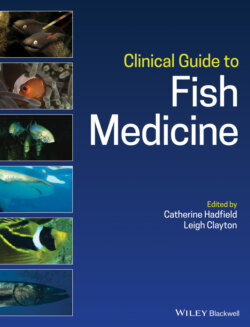Читать книгу Clinical Guide to Fish Medicine - Группа авторов - Страница 149
Other Additives
ОглавлениеOther dietary compounds can modulate animal health or performance in fish. Work in fish has demonstrated benefits from immune stimulants, probiotics, and prebiotics.
Immune stimulants are naturally occurring compounds that can increase resistance to disease. Most, if not all, essential nutrients influence disease resistance, particularly vitamins C and E (Blazer and Wolke 1984; Verlhac and Gabaudan 1994). Within non‐nutrient compounds, β‐glucans are the most commonly reported immune stimulants. When fed at low levels (<0.2% of the diet), β‐glucans can modulate fish immune responses and improve survival following subsequent disease challenge, particularly for extracellular bacterial infections (Sinha et al. 2011; Hixson 2014). Other examples of immune stimulants include garlic and propolis (Sforcin 2007; Lee and Gao 2012). Short‐chain fatty acids such as propionate may also modulate immune responses in fish (Hoseinifar et al. 2016). Further information on immune stimulants is available in Chapter A12 and reviews such as Lall and Tibbetts (2009), Nayak (2010), Verhlac‐Trichet (2010), and Kiron (2012).
Probiotics are cultures of micro‐organisms intended to colonize or influence intestinal flora (Nayak 2010). Numerous microbes have been identified as probiotics in fish (Lactobacillus, Lactococcus, Leuconostoc, Enterococcus, Carnobacterium, Shewanella, Bacillus, Aeromonas, Vibrio, Enterobacter, Pseudomonas, Clostridium, and Saccharomyces spp.). Many help feed conversion efficiency and growth, modulate the immune response, and confer protection against pathogens (Burr et al. 2005; Nayak 2010; De et al. 2014). Stability in the diet and efficacy are both concerns and more research is needed.
Prebiotics are nondigestible food ingredients that benefit the host by stimulating established microbial activity in the GI system (Yousefian and Amiri 2009). They are usually carbohydrates that are resistant to gastric acidity, hydrolysis, and fermentation. Prebiotics include oligofructose, transgalactooligosaccharides (TOS), inulin, and lactulose. They have shown similar benefits to probiotics in feed efficiency, growth, and immune function, but more research is needed (Yousefian and Amiri 2009).
